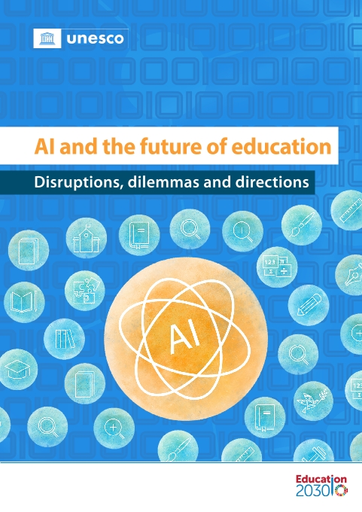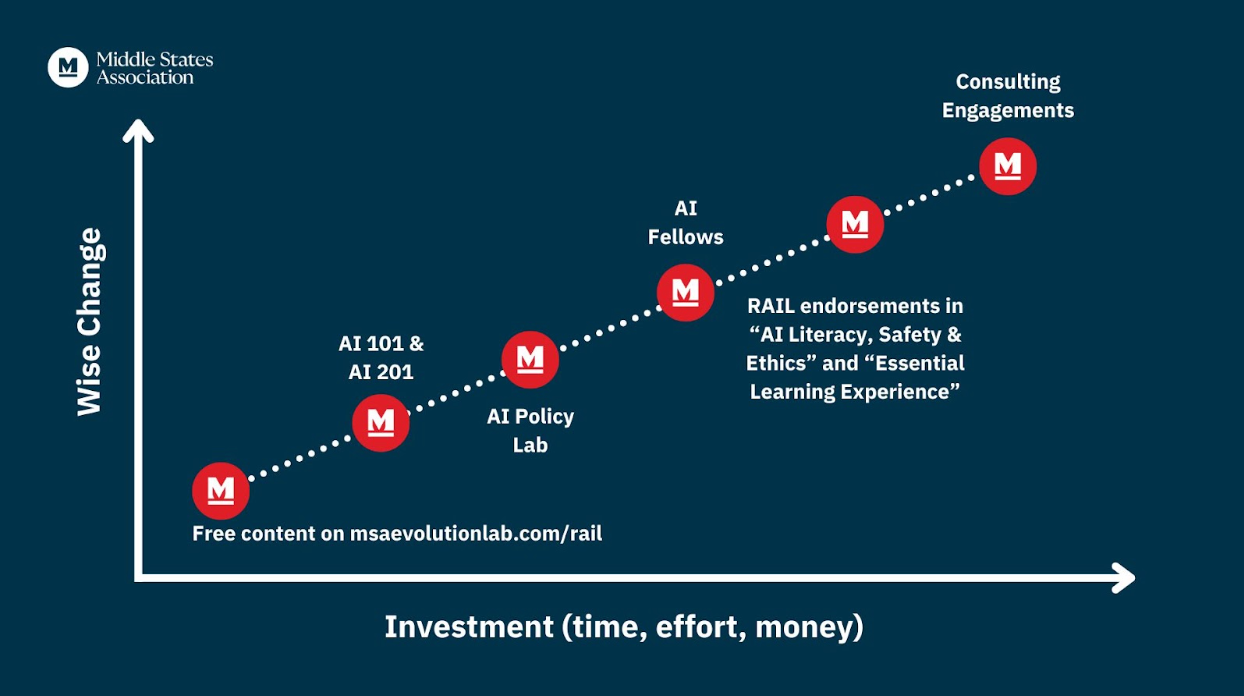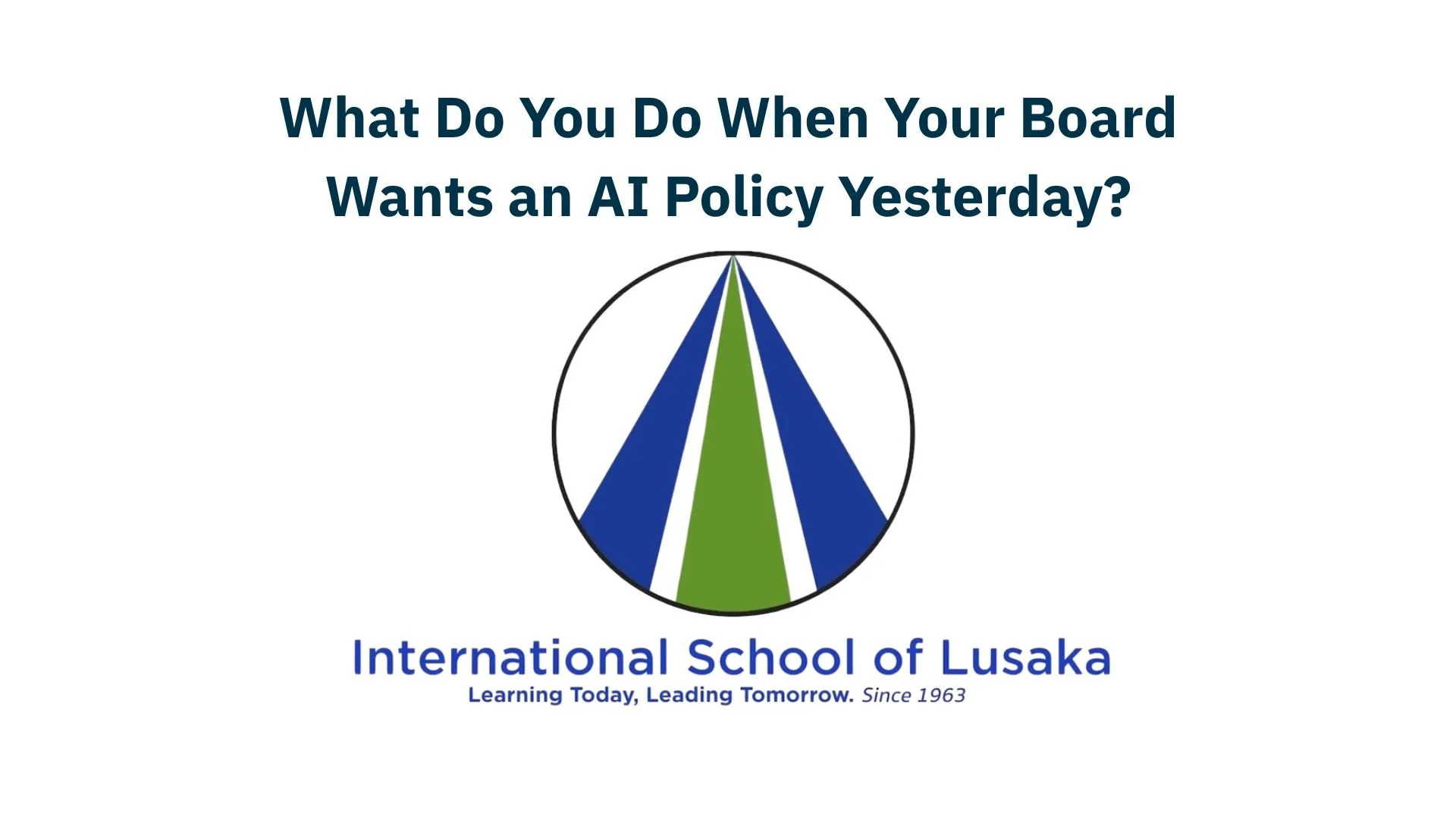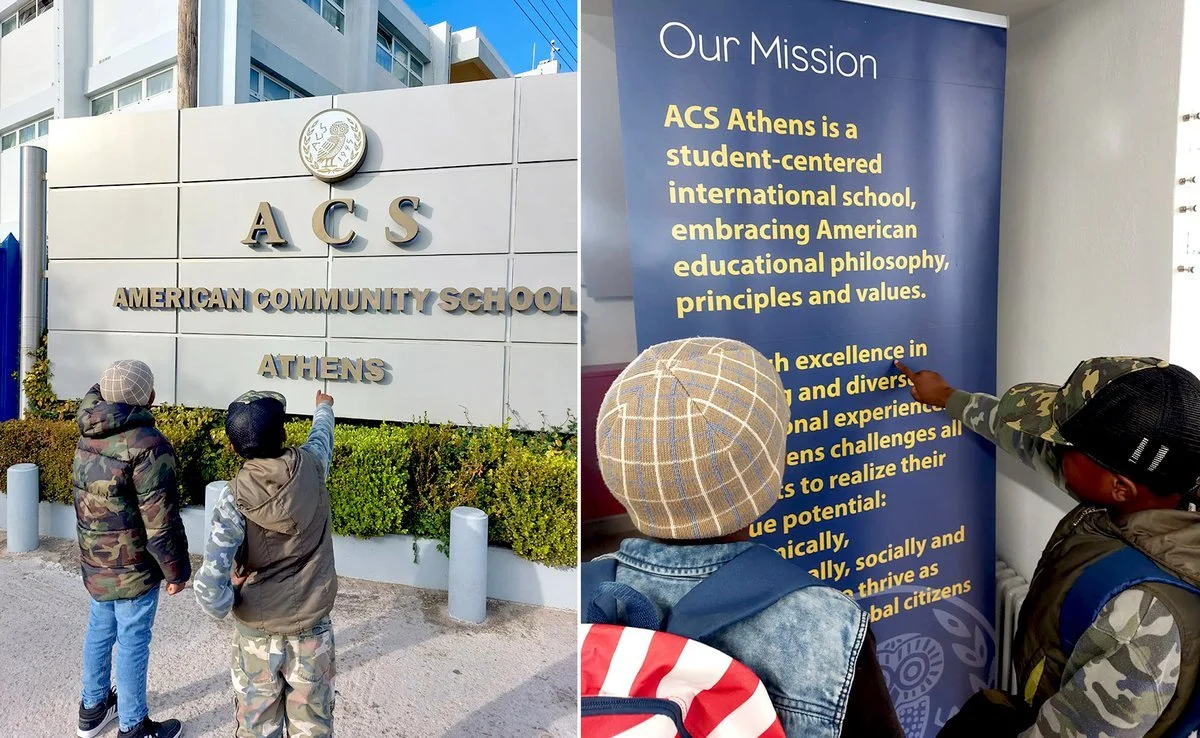
BLOG
Where Strategy, Innovation, and Equity Meet— Explore the Ideas Shaping Tomorrow’s School Leaders.
ALL THINGS AI
In conversations with education leaders across the Middle States network, one question keeps coming up: “How do we embrace AI without sacrificing what makes learning deeply human?”
Globally, education leaders are grappling with similar AI readiness questions, as reflected in UNESCO’s comprehensive new anthology, AI and the Future of Education: Disruptions, Dilemmas and Directions (UNESCO, 2025).
Excel is pairing AI with competency checks so students can show what they know and get to the right next step. They will expand their in-course tutor and teacher-facing supports with the same closed-system guardrails.
“AI will help students demonstrate competency and then challenge them in ways that fit their learning style” — Charlie Buehler Hoard, COO
This year marks a turning point for education. For the 2025–26 academic year, the Ministry of Education in the UAE is implementing an Artificial Intelligence curriculum across all public schools (Rasheed, 2025).
The goal of this curriculum is to strengthen students’ abilities to apply AI technology in a “safe, ethical, and responsible manner” (Rasheed, 2025).
Our latest spotlight features Mt. Lebanon High School in Pennsylvania. As a public school system, they approached AI with caution, not hype. With the RAIL endorsement as a guide, they created space for experimentation, grounded decisions in values, and made real shifts in both policy and practice. Their English department’s move to emphasize process over product is just one example of how responsible AI can drive deeper learning.
What if you aren’t ready for a full school commitment to AI? What do you do when only a few teachers are ready to lead the way? We have been working in stealth mode on something new to help schools adopt AI responsibly. It is an implementation framework that doubles as a community of practice. We call it AI Fellows.
When ChatGPT was released in late 2022, Dr. Liam Hammer had other priorities as the new Head of School of the International School of Lusaka. But as AI conversations intensified globally, the ISL board began pressing for immediate action. A board member had used ChatGPT to write an AI policy for the school and wanted to ratify that policy.
August 2025 marks one year since the first pioneering schools completed the world’s first (and only) endorsement in AI Literacy, Safety, and Ethics through RAIL—Responsible AI in Learning. We celebrate this milestone by revisiting some of these early adopters to reflect on what has changed for them since.
ACS Athens is one of these exemplary schools. And they didn’t simply complete the RAIL endorsement experience—they used it to lead real, system-wide change.
At Middle States, we define powerful learning as an experience in which learners develop purpose and agency as they develop knowledge, skills, and dispositions. ChatGPT Study Mode is not fostering purpose or agency. And it is questionable whether it is fostering knowledge, skills, or dispositions. Which means that at best, tools like ChatGPT’s Study Mode, KhanMigo, Claude’s Learning are anti-cheating tools.
LEADERSHIP INSIGHTS
Some leaders impress you with their intelligence. They seem to have mastered every angle of their work.
Other leaders impress you with their emotional intelligence. They make sure people feel seen and known and cared for.
And then there is a leader like Ren Parikh, the founder of Ideal Institute of Technology (“Ideal”). He’s more like a force of nature…
My recent conversation with Adam Bryant has me thinking about leading change in schools. Three particular things stand out from that chat:
Focus on “impact” rather than “intent.” Adam pointed out that if we over-index on purpose and mission (“intent”), we may lose sight of the reason to lead: to create positive impact.
We know that teachers can expect feedback on their craft substantially less than 1% of the time. Yet to foster genuine growth and development, merely increasing touch points is necessary, but insufficient.
SCHOOL CHANGE + TRANSFORMATION
Whatever this blog post’s title summons to mind for you, it is probably not the fashion show that I recently experienced at Pillar High School (NJ), a Middle States accredited school. But this fashion show reminded me of what the best schools do.
As a professional peer reviewer, you will see the entire system of a school in just three days. That is because Middle States standards and indicators map to every aspect of school operations—from daily classroom practices to long-term planning to foundational documents.
At Middle States, we worried that attitudes of compliance or credentialism would result in schools “integrating” AI into what they are already doing.
That’s why RAIL is not just an accreditation-style endorsement, but also an implementation framework. It relies on the wisdom of Stewart Brand’s “pace layering” model, which reflects how complex, adaptive systems change (or resist change) over time…
At Seton Hall Preparatory School in West Orange, N.J., school leaders are working to address student mental health and using data to measure the impact of their programs.
ACCREDITATION STORIES
Middle States helped VHS become an accredited Learning Service Provider (LSP). LSPs represent a growing number of non-traditional educational organizations committed to quality, innovation, and continuous improvement. The VHS journey offers valuable takeaways for schools navigating partnerships and program expansion:
As a professional peer reviewer, you will see the entire system of a school in just three days. That is because Middle States standards and indicators map to every aspect of school operations—from daily classroom practices to long-term planning to foundational documents.
No other form of professional learning can enable you—in 3 short days!—to “see the system” of a school, and certainly not while embedding you in real time. It’s like high intensity cross-training. You may come to the team with experience in teaching and learning, but you’ll also learn about governance, finance, facilities, and other foundational elements of running a school. I wish I had participated on more visiting teams before I had become a Head of School the first time—nothing would have been better preparation.
TEACHER GROWTH + DEVELOPMENT
If you’re a classroom teacher, you might not look forward to professional development days– and I can’t blame you. But I can try to convince you that PD can be more than just a necessary fact of life—it can be powerful, effective, and good for you and your students.
What makes for a great learning experience? It’s actually simple: When learners apply the knowledge they’ve gained to real-world situations that genuinely matter to them.
That is why teachers should have the opportunity to participate in project-based professional development.
Reading detailed feedback is rewarding, but things get more interesting when we debrief peer visits. Having read all 24 pieces of feedback, the visited teacher leads the debrief, rather than being put under the microscope by their visitors. This allows them to ask clarifying and probing questions aligned with their growth priorities. We visitors act as teammates, helping the visited teacher to level up.
To be clear, shifting from a zero-sum to a positive-sum model of school won’t be easy. As one of my former colleagues likes to say, “Teachers cannot create an experience for students that those teachers themselves have not had.” So if we want to initiate a shift in our schools from a zero-sum to a positive-sum worldview, we should begin by inviting teachers into new professional learning and growth experiences.






















This is precisely the moment that school leaders need to lean on what Michael Horn calls “tools of cooperation” in From Reopen to Reinvent. It’s not enough to have a powerful vision. It’s not enough even to know how you can get to that vision. As Horn says—and as I can confirm from experience earned the hard way—“Once a school leader has clarity around what they want to change, they still need to convince other individuals who will play a role in the change.”